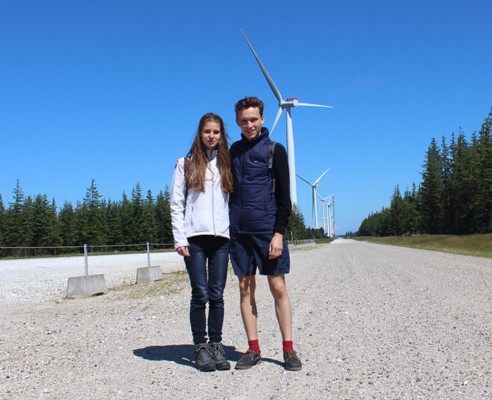
The following day she took us on a windy trip to a local lighthouse, and then back into Thisted. The widely reported perfect Danish work culture seemed to be in place, as most shops in the town centre had shut by early afternoon. After our first night staying with Johanne, we stayed in a local youth hostel which had only just been converted from hosting refugees. We found a beautiful walk from the hostel, and enjoyed the surrounding fields and pines forests, dotted with windmills and red brick farms.
After two nights at the hostel we took the bus northward to a tiny village called Ræhr. A school there has been converted into a learning centre for asylum seekers and Pia, the lead teacher, had kindly said we could stay there during our visit. During our stay we joined a class for those who had recently been granted refugee status by the government. This means that they are allowed to live and work in Denmark for two years. The asylum seekers refer to this as ‘getting positive’. The ‘positive’ class involves lessons in the Danish language and the country’s culture, as well as practical tips for everyday bureaucracy and getting employment.
This was the first time we were able to talk directly to asylum seekers. The class comprised several Syrians, one Afghan and a Sri-Lankan. They all had stories of escaping from violence, and it was surprising to hear what Ruben, the man from Sri-Lanka, had been through. They all had the same response to our questions of how they arrived in Denmark: by any means possible. And they answered in similar uniformity to questions of “why Denmark?”: they simply wanted to go anywhere that would take them, and allow them to live without violence.
During our stay we visited the various camps in which members of the class lived. One camp in Vesløs was a pleasant converted old people’s home, with large rooms and good natural light. A Syrian couple proudly showed us where they lived with their children in Vigsø, a family camp of converted holiday homes. There was a happy, safe atmosphere with children playing games and cycling around on donated bikes. It was clear that having a little house of their own meant a lot to the families there, making it especially sad that the camp was scheduled for closure by the beginning of September.
Pia managed to organise for us to meet Lars, the director of all the camps in the Thisted area. Lars was happy to talk and gave us a really good sense of the wider context of the camps. We discussed the recent election that brought an anti-immigration party into the ruling coalition in Denmark. Lars felt that people were being encouraged to see the asylum seekers as a problem rather than a challenge. He also disagreed with government measures to try and dissuade asylum seekers from coming to Denmark, particularly the shutting down of permanent camps and leaving the more expensive and ineffective tent camps open.
In our last days we visited the tent camp in Thisted, which was an eye-opening experience. Life in the camp – which hosted almost exclusively single men – looked more materially tolerable than might be expected: the tents had Wi-Fi and heating, and there were activities run throughout the week for the asylum seekers, including swimming and kayaking. It seemed to be the mental struggles that affects life there. Despite the efforts of camp staff, there’s little to do most of the time, and there are no facilities for the residents to prepare and cook their own food. Without anything to pass the time, many of the residents told us that they simply lie in their beds all day and feel severely depressed.
Our trip to Denmark was unforgettable for more reasons than just the travelling and sights. It gave a lot of perspective on the refugee crisis to meet the individuals presented as a mass crowd on TV news. The lengths they had gone to in the hope of one day having lives even a fraction as comfortable as our own was astonishing, and something we shouldn’t forget.
By Rachel Dunne (second year Physics and Philosophy) and Ben Davies (second year English)
The Brasenose Annual Fund, which helped Ben and Rachel cover the costs of their trip, exists to fund student research, extracurricular activities, and educational and personal development.
